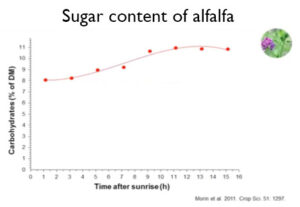Tips for Increasing Sugar Content in Forages
Cattle that consume forages with higher sugar content have higher rates of gain, improved performance and better rumen health.
In a past BCRC webinar, Gilles Bélanger, PhD, a Research Scientist at Agriculture and Agri-Food Canada and Robert Berthiaume, PhD, a dairy production expert in forage systems at Valacta, offered the following tips for producers to increase the sugar content in their forages:
Cut forages in late afternoon
As the day progresses, the plant increases in sugar content and is at its highest levels between 11 and 13 hours after sunrise (late afternoon). This benefit is maintained after cutting. Although swathing reduces the sugar content, it will remain higher in forages that were cut in late afternoon as compared to those cut in the morning. Learn more from the webinar recording: 9:05 -19:56.)
Choose forage species with naturally higher sugar concentrations
In addition to management, forage breeding and selection play a role in sugar content. Dr. Belanger described research results that indicate that Tall Fescue and Red Clover have the greatest sugar content, while Reed Canarygrass and Alfalfa have the lowest sugar concentrations of the eight species they studied. Dr. Belanger and his research team are working to genetically select for higher sugar content in Alfalfa. (19:56 – 22:50)
When grazing forages, move cows in the afternoon
Studies have shown that higher sugar content of grasses in the afternoon result in increased forage intake, which increases weight gain in both cows and calves. Therefore, if possible, move cattle onto new pasture in the afternoon rather than in the morning. (40:05 – 42:02)
Like all past BCRC webinars, you can watch the full recording at any time on our website
Click here to subscribe to the BCRC Blog and receive email notifications when new content is posted.
The sharing or reprinting of BCRC Blog articles is welcome and encouraged. Please provide acknowledgement to the Beef Cattle Research Council, list the website address, www.BeefResearch.ca, and let us know you chose to share the article by emailing us at info@beefresearch.ca.
We welcome your questions, comments and suggestions. Contact us directly or generate public discussion by posting your thoughts below.
